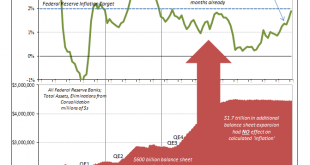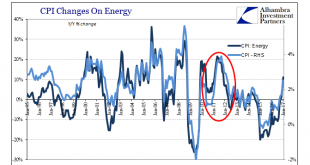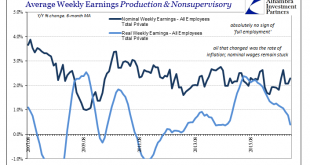The PCE Deflator for January 2017 rose just 1.89% year-over-year. It was the 57th consecutive month less than the 2% mandate (given by the Fed itself when in early 2012 it made the 2% target for this metric its official definition of price stability). Though there is a chance that the streak will end with the update for February, it should not go unnoticed how weak that number is given that oil prices in January were...
Read More »U.S. CPI after the energy push
The Consumer Price Index for January 2017 rose 2.5%, pulled upward by its energy component which thanks to oil prices now being comparing to the absolutely lows last year saw that part of the index rise 11.1% year-over-year. Given that oil prices bottomed out on February 11, 2016, this is the last month where oil prices and thus energy inflation will be at its most extreme (except, of course, should WTI actually rise...
Read More »Real Wages Really Inconsistent
Real average weekly earnings for the private sector fell 0.6% year-over-year in January. It was the first contraction since December 2013 and the sharpest since October 2012. The reason for it is very simple; nominal wages remain stubbornly stagnant but now a rising CPI subtracts even more from them. Consumers receive no significant boost to their incomes, but are starting to pay more (in comparative terms) for things...
Read More »Beware the Ides of the Earnings Season!
It is critical for an investor to be very vigilant during the earnings season, which already began on January 11 with Alcoa (AA) reporting its results. Not only do companies report their financials, but they also make other significant announcements, such as either raising or lowering their earnings guidance for the coming months. Given the importance of this information, it is no surprise that a company’s stock can often soar or plunge on these disclosures. Therefore, investors need to be...
Read More »US Equities: Stay with Growth
The third quarter wasn’t kind to U.S. stocks. The S&P 500 fell 6.4 percent, with stocks battered by everything from fears over China’s growth slowdown and financial market collapse to uncertainty about Federal Reserve policy and the Volkswagen emissions scandal. In June, the consensus view on third-quarter earnings was a 1 percent decline. Heading into earnings season, that figure has been revised downward to a 5 percent decrease. With the fourth quarter underway, none of the issues that...
Read More »A Revenue Recession Points to More M&A Ahead
As the second-quarter earnings season draws to a close in the United States, with 89 percent of companies in the S&P 500 having announced quarterly results, there’s both good and bad news to report. Sugar first: Seventy-four percent of companies beat consensus estimates, slightly better than the 10-year average of 70 percent. The outlook for the future is getting rosier, too. The consensus forecast for 12-month forward earnings growth is now 7.2 percent, up from 5.2 percent at the...
Read More » Swiss Economicblogs.org
Swiss Economicblogs.org




